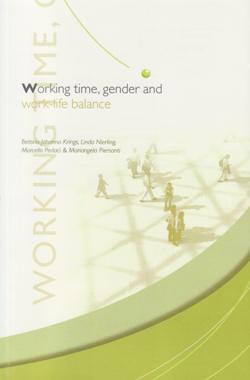Bettina-Johanna Krings, Linda Nierling, Marcello Pedaci, Mariangela Piersanti
Working time, gender and work-life balance
Leuven: Katholieke Universiteit Leuven. Higher institute of labour studies, 2009. 83 S. ISBN 978-90-8836-014-5., Euro 10,58
[Volltext/pdf, 909 kb]
[Contents]
INTRODUCTION
It is generally agreed that major upheavals are taking place in the organisation of work as corporate structures are transformed in the context of economic globalisation and rapid technological change. But how can these changes be understood? And what are the impacts on social institutions and on workers? The ‘Work organisation and restructuring in the knowledge society (WORKS)’ project was funded by the European Commission in 2005 under its 6th Framework Programme to investigate these questions. With partners in seventeen different institutions in fourteen EU member states, this ambitious research project has combined theoretical work and a detailed analysis of a wide range of statistics with in-depth case studies to analyse the forces that bring about these changes, including global value chain restructuring and the policy environment.
One of the underlying assumptions of the WORKS project is that the reorganisation of work can only be understood fully in the context of a global restructuring of value chains, entailing a simultaneous decomposition and recomposition of sectors, organisations, labour processes and skills. However, the considerable heterogeneity within Europe of skill supply, levels of employment, welfare systems, and economic sectors makes it especially difficult to disentangle the causes and effects of such processes and to isolate the primary drivers of change. Yet it is particularly important for Europe both to understand the factors that will enable firms to sustain their competitive edge, to ensure a future supply of jobs that is satisfactory both quantitatively and qualitatively and to examine the impact of these changes on the quality of life. At the heart of this is a single issue: how are employment practices adapting to change and with what effect? If we can answer this more effectively on a Europe-wide basis we will be able to propose practical solutions to real problems.
Starting in June 2005, the WORKS consortium, involving partners from seventeen different institutes across fourteen EU member states, carried out an ambitious programme of theoretical and empirical work. These were carried out under five main pillars: ‘theories and concepts’, ‘quantitative research’, ‘policy’, ‘qualitative research on organisations’ and ‘qualitative research on individuals’. The work of these pillars is summarised more fully below.
This is one of eleven thematic reports that brings together the results of all five pillars to deepen our insights into the topic of working time, gender and work-life balance. The other reports will focus on the topics of: value chain restructuring in Europe in a global economy; changes in work organisation and representation at the workplace; strategies to reach flexibility in the organisation; skills and qualification policies and HRM; new career trajectories and biographies; changing gender and ethnic relations in the workplace; change processes and future perspectives; changes in work in transitional economies; health, safety and the quality of working life; and employers’ use of technology and the impact on organisational structure.
